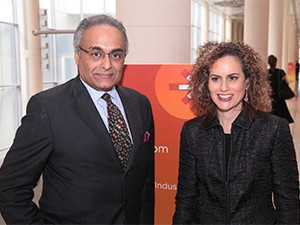
Africa is not innovating as fast as the rest of the world when it comes to the Internet of things (IOT), according to Inbar Lasser-Raab, VP for products & solutions marketing for Cisco. She was speaking at a press briefing at Cisco's third annual Internet of Things World Forum (IoTWF), currently taking place in Dubai, United Arab Emirates.
"We are seeing less in Africa [in terms of IOT] than in other parts of the world, but there could be huge potential in areas like mining and agriculture... there is less innovation coming from there, but there are some applications from other parts of the world that are starting to work for Africa," she says.
Cisco unveiled its smart city evolutions in five global cities, but none are in Africa. Dubai is being hyped as one of the most technologically advanced cities in the world, and Cisco is this year showcasing more than 20 digital city and connected industry solution deployments in the city. This is more than twice as many solutions as were featured at the 2014 IoTWF event in Chicago in the US.
"As host to the 2015 IoTWF, Dubai is rapidly transforming into becoming one of the smartest digital cities in the world, connecting the unconnected through the power of intelligent networks," according to Anil Menon, president of Smart+Connected Communities at Cisco.
Other than Dubai, cities that have already begun using a single digital data platform for managing their urban services include Kansas City in the US, Adelaide in Australia, Hamburg in Germany and Bangalore in India.
"We have passed the incubation phase, now IOT/smart city solutions are ready to be scaled. Cities that scale first will be the winners in an increasingly competitive environment," says Menon.
The deployments featured in Dubai include IOT services such as connected parking, connected lighting and waste management, alongside other vertical industries. In Dubai's command and control centre, nearly all the solutions are integrated into a digital platform. The digital platform can aggregate data from various sensors, solutions, and partner applications; conduct advanced data analytics; and support a wide spectrum of urban services.
"Beyond Dubai, utilising the digital platform in conjunction with the portfolio of Smart+Connected Communities solutions are helping cities to achieve their digital transformation goals. For instance, a number of cities have made strides in reaching their COP21 climate goals by reducing traffic, encouraging greater use of public transit and streamlining the delivery of services to citizens," says Cisco.
In Africa, Cisco says it's about finding local partners who understand African businesses to make IOT a reality. Cisco does, however, see SA as a strong potential market for IOT, as well as Egypt, Kenya, Nigeria and Botswana.
"As we move into this new digital era, organisations across both the private and public sectors are already beginning to rethink how they will approach the shift in infrastructures, processes and outcomes on a grand scale. It is likely to disrupt every area of society and redefine sustainability," says Cisco.
Smart cities speak out
The Dubai Design District (d3) says it is proud to be showcasing some of the real-time smart initiatives that are being deployed in the district.
"Our aim is to select and implement those smart solutions that will bring significant benefits to business partners, visitors and management and, importantly, to Dubai as a smart city," says Mohammad Saeed Al Shehhi, COO for d3.
"Through these unique and technologically enhanced initiatives, d3's creative tenants will benefit by saving on utility consumption, they will receive an enriched customer experience, improved safety standards, and they will be able to tap into effective, real-time data analytics that help drive their business forward."
Rama NS, CEO of Bangalore's Electronic City Industries Association (ELCIA), says data from the city's digital platform for lighting and parking has helped them understand the energy consumed by public street lighting as well as the usage of on-street parking at the ELCIA campus.
"We are now beginning to socialise this data with other sensor devices/applications development companies in ELCIA so that they can manufacture, test and deploy new types of sensors and applications in the Living Lab that has been set up in partnership with Cisco."
"Our Smart City pilots will help us demonstrate the value of a sensor-connected infrastructure to deliver new and improved citizen experiences. We want to empower and engage our residents, to deliver new city experiences, to share and optimise our city data to support new business development and entrepreneurs, and to attract new investment into the city," according to Jane Booth, GM for city and organisational development for the Adelaide City Council.
The Hamburg Port Authority's CIO, Sebastian Saxe, also believes a holistic model will help businesses in his city without interfering with citizens' experiences.
"To create a model where we are able to do this without negatively impacting the citizens and the city itself is our goal."
Share